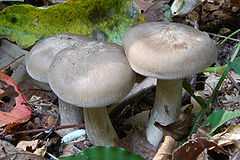Lyophyllum decastes
| Lyophyllum decastes | |
|---|---|
 | |
| Lyophyllum decastes | |
| Scientific classification | |
| Kingdom: | Fungi |
| Phylum: | Basidiomycota |
| Subphylum: | Agaricomycotina |
| Class: | Agaricomycetes |
| Subclass: | Agaricomycetidae. |
| Order: | Agaricales |
| Family: | Lyophyllaceae |
| Genus: | Lyophyllum |
| Species: | L. decastes |
| Binomial name | |
| Lyophyllum decastes | |
Lyophyllum decastes, commonly known as the fried chicken mushroom, is an edible species of fungus in the Lyophyllaceae family that grows in clusters on disturbed ground, with a faintly radish-like taste.[1]
Appearance
The cap measures 1 to 5 inches across (2.5 cms to 12.7cms), is convex to almost flat, beige, yellow brown or grayish. At first its margin is in-curved, becoming scalloped, then upturns as the mushroom ages.[2] The spore print is white and the whitish stalk or stipe is 2 to 4 inches (5 to 10cms) long, 1/4 to 3/4 inch (.6 to 2cms) wide, and has no veil.[2] Gills are white but may yellow slightly with age. The firm flesh remains white on exposure.[1]
Ecology
Growing in dense, even huge clusters on the ground, L. decastes is usually found where the ground has been disturbed such as roadbeds, gravel, paths, landscaping areas, and sometimes in woods.[1]
Range
Prolific in Summer and Fall until Spring on the U.S. West Coast, it is widely distributed in North America[1] though known as a European mushroom.
Uses
L. decastes is edible and useful in vegetarian and vegan dishes as a meat replacement vegetable protein. Mild in flavour, and slightly fragrant, it is noted by some[2] to thicken dishes in the way of okra. Brill also suggests using caps separately, sliced, for adding to dishes; and using stems for pureé in soup.[2] It is recommended with this edible mushroom, to taste in small amounts to determine any sensitivity to the item.[2]
References
Further reading
- Breitenbach, J. & Kränzlin, F. (1991). Fungi of Switzerland. Volume 3: Boletes and Agarics (1st Part). Strobilomycetaceae, Boletaceae, Paxillaceae, Gomphidiaceae, Hygrophoraceae, Tricholomataceae, Polyporaceae (lamellate). Verlag Mykologia: Luzern, Switzerland. p 361.
- Moncalvo, J.-M. , Rehner, S.A. & Vilgalys, R. (1993). "Systematics of Lyophyllum Section Difformia Based on Evidence from Culture Studies and Ribosomal DNA Sequences." Mycologia 85(5): 788-794.
External links
| Wikimedia Commons has media related to Lyophyllum decastes. |